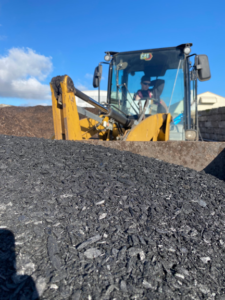Update
Food For Climate Solutions Grantee Spotlight: A Q&A with Kulshan Carbon Trust
Take an inside look into the work of TRFF Food for Climate Solution grantees that are reducing the effects of climate change while strengthening our regional food system. Kicking off the series is Kulshan Carbon Trust (KCT), a non-profit accelerating local adoption of natural climate solutions (NCS) in Northwest Washington that reduce greenhouse gas emissions, sequester carbon, regenerate ecosystems, and revitalize rural economies.
This interview has been edited for clarity
How is your organization addressing the climate crisis?
KCT acts as a local hub for stakeholders to come together and identify ways of combining efforts to implement NCS. We focus on engaging subject matter experts and experienced practitioners through our collaborative workgroups to inform our on-the-ground work with land stewards. Our Community Biochar Program engages farmers and landholders in biochar production demonstrations and events using low-tech, portable Ring of Fire kilns to turn agricultural and forestry residues into valuable soil amendments in partnership with Whatcom and Skagit Conservation Districts. We have hosted five demonstrations and have reached over 50 stakeholders who have shown great enthusiasm for this waste-reducing, carbon-sequestering and value-added solution.

We are now expanding this program in our Biochar Scale-Up Project by conducting field trials with local farmers to study the impacts of biochar-enhanced compost application on local agricultural soils and crop production. We are also working to expand the agricultural market for biochar by offering it through our project partner, Skagit Soils. Biochar connects forests and fields and integrates effectively with other natural climate solutions like regenerative agriculture and reforestation. Widespread adoption of NCS will contribute to local climate resilience while providing new economic opportunities for rural communities.
What strategies and mechanisms will Kulshan Carbon Trust employ to ensure equitable distribution of eco-credits among project participants, especially historically marginalized farmers? How will these eco-credits be integrated into their revenue streams to incentivize regenerative agriculture and natural climate solutions in the region?
Kulshan Carbon Trust develops collaborative natural climate solutions by convening stakeholders and facilitating engagement between and among project participants. We seek to identify common interests and develop understandings that will support the application of co-composted biochar as a superior soil amendment for the benefit of local farmers. KCT’s role is to link an end-to-end value chain from funding sources through the supply chain to the land stewards hosting the regeneration projects while advocating for climate justice. Unfortunately, the biochar producer, Restoration Fuels, has not yet been able to provide the documentation necessary to issue eco-credits for the carbon sequestered by the co-composted biochar.
We are working with Puget Sound Food Hub and Viva Farms to identify and connect KCT with historically marginalized farmers. In selecting project participants, we have given underserved growers preference in allocating available biochar supplies and subsidizing transportation costs. KCT serves as a resource to level the playing field for marginalized farmers who wish to apply for valuable incentives from state and federal programs for this soil enhancement product.
At this stage of the scale-up project, KCT is focused on field trials to demonstrate the value of biochar-enhanced compost in improving soil health and plant growth rates. As the project achieves scale, KCT will convene and facilitate a collaborative workgroup to develop a class of eco-credits that will leverage biochar’s long-term carbon sequestration and regeneration impacts when used in agricultural settings. KCT will fund an advisory role in this workgroup to represent underserved growers and ensure that historically marginalized farmers receive an equitable allocation of future eco-credits.

What are your top priorities this year/the next few years?
The KCT team is excited to use our biochar work to bridge other natural climate solutions, especially agroforestry and regenerative agriculture, in the next few years. We have been building valuable relationships in this space and have some exciting project opportunities for 2024/2025. Specifically, we’re focused on convening experts to develop best practices surrounding biochar integration into forest farming and riparian restoration. We believe biochar will significantly increase seedling resilience, reduce mortality rates and increase the efficacy of reforestation and planting efforts. Additionally, we are focused on expanding our team to include an executive director who can continue to grow our mission and impact.
What has been your greatest obstacle in championing your mission?
Our work has focused on measuring the carbon dioxide removal benefits that biochar projects deliver by sequestering carbon. Recent reports indicate that some reforestation and forest preservation projects generating carbon credits may need more evidence to support their carbon impact claims, shaking confidence in voluntary carbon markets. We are working with others to ensure that our measurement, monitoring, reporting and verification (MMRV) for natural climate solutions are trustworthy.
We also recognize that valuing carbon alone will not make natural climate solutions financially viable. Therefore, we aim to enable natural climate solutions that deliver ecosystem services and economic value in measurable and meaningful ways.
KCT aims to enable regenerative restoration projects that recognize the value and services provided by carbon-rich ecosystems to humans and the environment. In this case, we want to acknowledge biochar’s co-benefits, including reduced water use and increased crop yield. These benefits can be challenging to quantify, and we rely heavily on MMRV to ensure credible value. 
Our challenge at KCT is to navigate the complex and evolving nature of payments for ecosystem services. We aspire to recognize the benefits of natural climate solutions beyond carbon sequestration, such as biodiversity, water retention and quality improvements, and soil vitality. We also understand the need to reduce the barrier to entry into these markets and the level of complexity that confronts smallholder participants. Because of this, we’re developing a place-based approach to crediting ecological services (eco credits) that revolves around community engagement, local marketing, and decentralized verification strategies.
While voluntary carbon markets have become prominent, markets for ecosystem services such as biodiversity, wildfire risk reduction, water savings, etc., are just starting to emerge. This puts KCT in the challenging position of innovating eco-credit methodologies in a nascent regenerative finance marketplace.